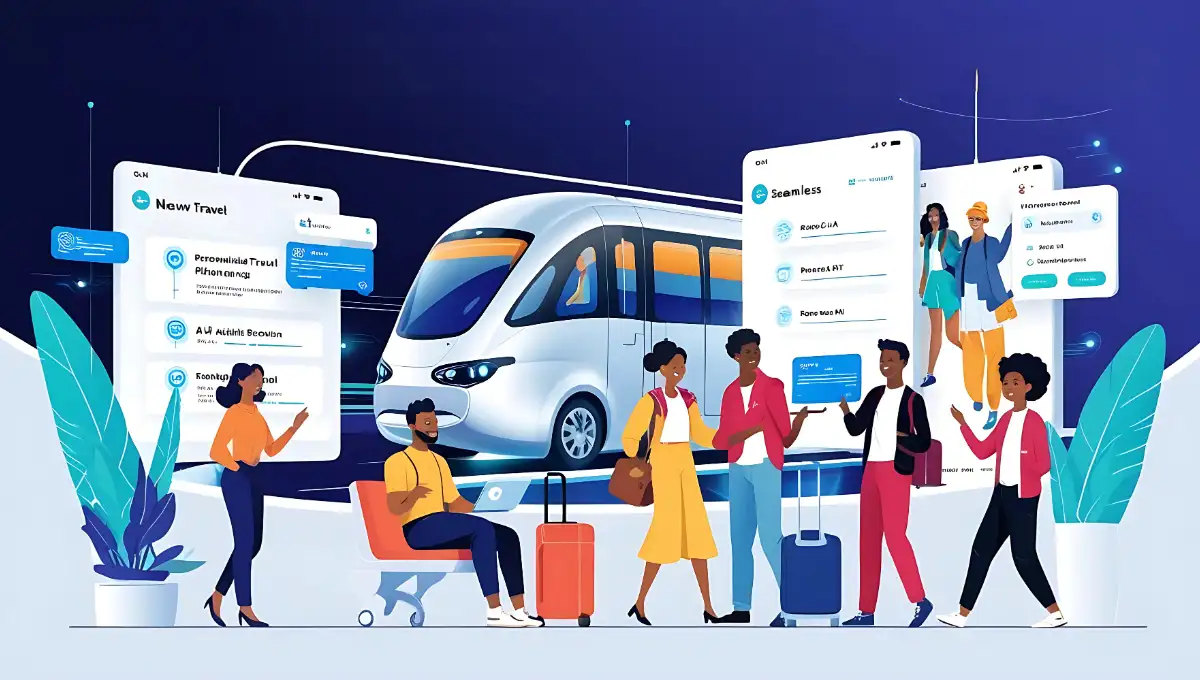AI is reshaping the travel industry faster than ever, and DeepSeek AI is at the forefront of this revolution.
Imagine planning a trip where AI books flights, hotels, and suggests hidden local gems—all in seconds.
That future is here, and DeepSeek AI is leading the charge. But here’s the problem: 64% of travel companies still struggle with outdated tech.
I tested DeepSeek’s tools firsthand and saw how it could save hours of work—or wipe out jobs.
In this guide, we’ll break down how DeepSeek AI is affecting the travel industry, its advantages and disadvantages, and how we can adapt to these changes.
 How DeepSeek AI is Transforming the Travel Industry
How DeepSeek AI is Transforming the Travel Industry

1. Personalized Travel Planning
DeepSeek AI analyzes customer preferences, past bookings, and real-time data to offer hyper-personalized travel recommendations. This means:
- Tailored hotel and flight suggestions.
- AI-generated itineraries based on interests, budget, and location.
- Real-time adjustments for changing plans.
2. AI-Powered Customer Support
AI chatbots and virtual assistants can now handle inquiries, process bookings, and resolve complaints in seconds. This results in:
- Faster response times and 24/7 customer support.
- Reduced need for human customer service representatives.
- Enhanced language translation for global travelers.
3. Automated Pricing & Dynamic Packages
AI can analyze market trends, demand, and traveler behavior to:
- Offer real-time dynamic pricing for flights and hotels.
- Predict the best time to book trips.
- Create flexible travel packages that adjust to demand.
4. AI in Security & Fraud Prevention
DeepSeek AI enhances travel security by:
- Identifying fraudulent transactions in bookings.
- Analyzing travel patterns for risk assessment.
- Enhancing airport security with facial recognition and biometric authentication.
5. Smart Travel Assistance & Navigation
AI-powered apps provide real-time assistance through:
- Voice-controlled travel guides.
- Augmented reality (AR) maps for navigation.
- AI-driven translation for seamless communication in foreign countries.
6. Cost-Efficient AI Tools
DeepSeek’s models cost 90% less to train than rivals like OpenAI 15. For travel companies, this means:
- Cheaper chatbots: Automate customer service without breaking the bank.
- Affordable trip planners: Build AI tools that rival Expedia or Booking.com at a fraction of the cost.
Example: Amex GBT scrapped AI projects due to high costs—DeepSeek could make them viable.
Advantages of DeepSeek AI in the Travel Industry
✅ Increased Efficiency: Automates bookings, customer service, and itinerary planning, reducing manual work.
✅ Better Personalization: AI curates recommendations based on user behavior, making travel experiences more tailored.
✅ Cost Savings for Businesses: Reduces the need for human labor, cutting operational costs. Train AI models for 5.5Mvs.OpenAI’s100M
✅ Improved Security: Enhances fraud detection, airport security, and risk assessment.
✅ Enhanced Customer Experience: Provides 24/7 AI support and real-time travel assistance.
✅ Sustainability: Uses less energy (FP8 precision cuts GPU power needs)
Disadvantages of DeepSeek AI in the Travel Industry
❌ Job Losses: Replacing human roles in customer service, booking agents, and tour guides.
❌ Data Privacy Concerns: AI requires massive amounts of user data, raising security and privacy risks.
❌ Over-Reliance on AI: Dependence on AI-generated suggestions might reduce human creativity and exploration.
❌ Bias in AI Algorithms: AI recommendations can be skewed based on past data, limiting diverse options.
❌ Tech Failures & Glitches: AI systems can fail, leading to booking errors and customer dissatisfaction.
How to Overcome AI’s Negative Impact
1️⃣ Upskill & Adapt: Travel professionals should learn AI-related skills like data analysis, digital marketing, and AI-powered customer service.
2️⃣ Emphasize Human Touch: While AI can handle basic tasks, businesses should focus on personal interactions to enhance customer loyalty.
3️⃣ Improve AI Transparency: Companies should clearly communicate how AI algorithms work and ensure fairness in recommendations.
4️⃣ Strengthen Data Protection: Travelers must be aware of data privacy concerns and opt for secure AI-powered platforms.
5️⃣ Combine AI with Human Expertise: Use AI for efficiency but maintain human oversight for quality control.
How to Use DeepSeek AI to Improve Productivity in the Travel Industry
🚀 For Travelers
- Use AI-powered apps to get real-time flight and hotel recommendations.
- Leverage AI translation tools for smooth international travel.
- Explore AI-generated itineraries for hassle-free planning.
🚀 For Travel Businesses
- Implement AI chatbots for customer support to reduce response time.
- Use AI-driven marketing tools to target the right audience.
- Automate pricing strategies to maximize revenue.
🚀 For Travel Bloggers & Content Creators
- Use AI to analyze trending travel topics and optimize SEO.
- Generate AI-powered travel guides and itineraries.
- Leverage AI tools for video editing and content recommendations.
Conclusion
DeepSeek AI is revolutionizing the travel industry by improving efficiency, personalization, and security. While it brings incredible benefits, it also poses challenges like job automation and privacy risks. The key is to strike a balance—leveraging AI’s strengths while ensuring human creativity and expertise remain at the forefront.
By embracing AI responsibly, travelers and businesses can enhance their experiences, increase productivity, and stay ahead in the ever-evolving travel landscape.
You’re wasting your Netflix Subscription: If you haven’t watched these 14 must watch movies.
Florida Panthers Stanley Cup Victory Parade 2025: Everything You Need to Know


